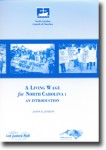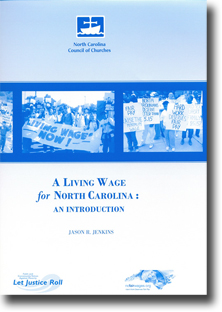Click here to download (1.6 Mb)
From the Preface:
A Living Wage for North Carolina: An Introduction is intended to be just that: an introduction. Exhaustive research abounds on the subjects of the minimum wage and living wage. Yet often these studies—while thorough and informative—assume that the reader has a certain level of expertise. This brief resource seeks to be a primer for readers who are interested in fair wages but do not have the background or resources available to conduct an independent investigation.
A Living Wage for North Carolina begins with the origins and inadequacy of the minimum wage in North Carolina and the U.S. This is a proper starting point: to understand the necessity and benefits of a living wage, one must first understand the shortcomings of the current minimum wage. From there, this resource explores what a living wage is, how it is calculated, and how it has been implemented in North Carolina using two recent cases in the city of Durham, and Orange County.
The research of John Quinterno, Elizabeth Jordan, and Sorien Schmidt (among others) of the North Carolina Justice Center in Raleigh informs much of the data contained in this primer. The Justice Center is a leading private, non-profit, anti-poverty organization. We as North Carolinians are extremely fortunate to have this organization in our midst, continually fighting for social justice and looking out for those society deems marginal.
Finally, as this resource originates within the North Carolina Council of Churches, a faith perspective also is offered about the need for fair wages in this state and country. Some of this material is informed by the work of Rev. Dr. Paul Sherry and Holly Sklar of Let Justice Roll Living Wage Campaign: Faith and Community Voices Against Poverty out of Washington, D.C. Dr. Sherry and Sklar’s tireless work around the minimum and living wage shows that there is hope yet for those who are unable to make ends meet in our wealthy country.
We hope this resource will encourage readers to begin exploring in depth the need for a living wage, and to, perhaps, begin the process of implementing a living wage ordinance in their communities.
Jason R. Jenkins
Program Associate
North Carolina Council of Churches
Fall 2006


